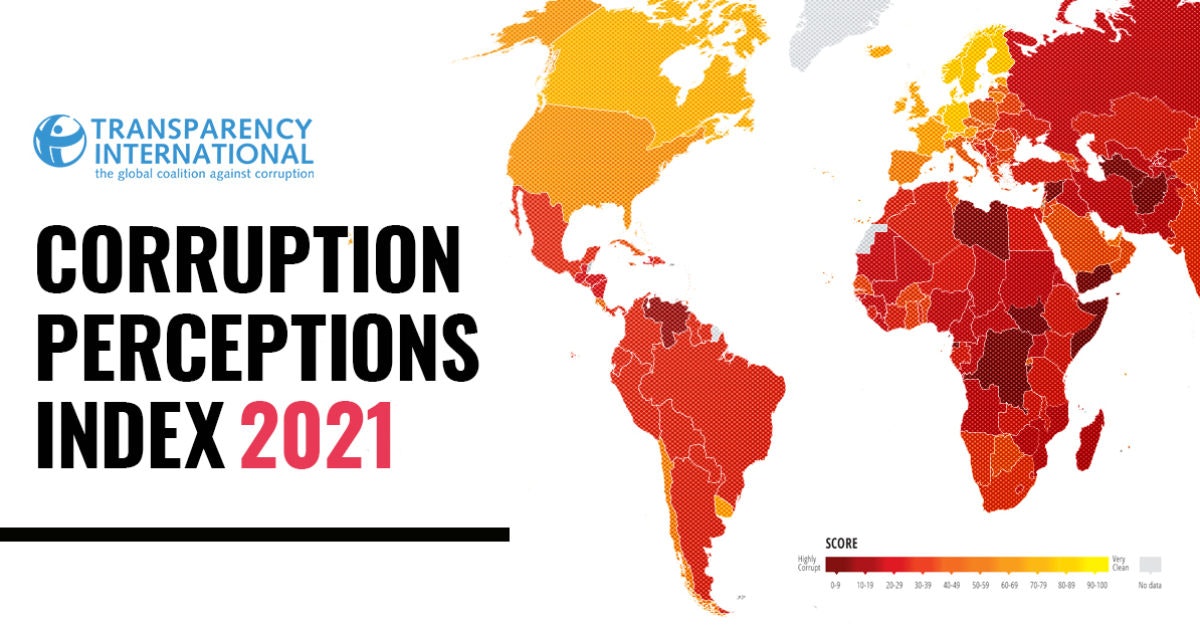Guyana went down by two points with a score of 39 and ranking of 87 out of 180 countries in the latest Transparency International (TI) Corruption Perceptions Index (CPI) Report 2021 released today – the first full year of the PPP/C’s new term in office.
The country however tops the list of countries that have made significantly positive improvements over the years. In recent years Guyana has been pointed out in the TI indices as one of the better performing countries.
“These countries significantly improved in the last 10 years: Afghanistan, Angola, Armenia, Austria, Belarus, China, Cote d’Ivoire, Estonia, Ethiopia, Greece, Guyana, Italy, Latvia, Moldova, Myanmar, Nepal, Paraguay, Senegal, Seychelles, South Korea, Tanzania, Timor-Leste, Ukraine, Uzbekistan and Vietnam,” the report stated.
The new report shows that the battle against corruption is faltering with 86 per cent of countries making little to no progress in the last 10 years. It was stated that at the top of the CPI, countries in Western Europe and the European Union continue to wrestle with transparency and accountability in their response to COVID-19, threatening the region’s clean image. In parts of Asia Pacific, the Americas, Eastern Europe and Central Asia, increasing restrictions on accountability measures and basic civil freedoms allow corruption to go unchecked. Even historically high-performing countries are showing signs of decline.
According to the report a country’s score is the perceived level of public sector corruption on a scale of 0-100, where 0 means highly corrupt and 100 means very clean.
On the other hand a country’s rank is its position relative to the other countries in the index. Ranks can change merely if the number of countries included in the index changes. The rank is therefore not as important as the score in terms of indicating the level of corruption in that country, the report indicated.
Once again the highest ranking Caribbean country is Barbados with a score of 65, one up from last year and it remains ranked at 29. It is followed by The Bahamas with a score of 64, one up from last year, and a ranking of 30, St Vincent and the Grenadines’ score remains at 59 and ranking 36, Dominica’s score remains at 55 and but it now ranks at 45, Grenada’s score also remains at 53 and it is ranked at 52. Jamaica’s score also remains at 44 but its rank went up by 1 to 70. Trinidad pipped Guyana this year as it score increased by one to 41 and it is now ranked at 82.
The top countries on the Index are Denmark (88), Finland (88) and New Zealand (88), all of which also rank in the top 10 per cent in the world on the Democracy Index civil liberties score.
On the lower end Somalia (13), Syria (13) and South Sudan (11) remain at the bottom of the CPI. Syria is also ranked last in civil liberties (Somalia and South Sudan are unrated).
In the last decade, 154 countries have either declined or made no significant progress.
According to the report, as anti-corruption efforts stagnate worldwide, human rights and democracy are also under assault.
“This is no coincidence. Our latest analysis shows that protecting human rights is crucial in the fight against corruption: countries with well-protected civil liberties generally score higher on the CPI, while countries who violate civil liberties tend to score lower,” the report noted.
It was pointed out that the global COVID-19 pandemic has also been used in many countries as an excuse to curtail basic freedoms and side-step important checks and balances.
Also, according to the report, many high-scoring countries with relatively “clean” public sectors also continue to enable transnational corruption – with consequences for their own corruption levels.
Transparency International calls on governments to act on their anti-corruption and human rights commitments and for people across the globe to join together in demanding change.
The report said that since its inception in 1995, the CPI has become the leading global indicator of public sector corruption.
“The Index scores 180 countries and territories around the world based on perceptions of public sector corruption, using data from 13 external sources, including the World Bank, World Economic Forum, private risk and consulting companies, think tanks and others. The scores reflect the views of experts and business people,” the report said.
The process for calculating the CPI is regularly reviewed to make sure it is as robust and coherent as possible, most recently by the European Commission’s Joint Research Centre in 2017. All the CPI scores since 2012 are comparable from one year to the next.

